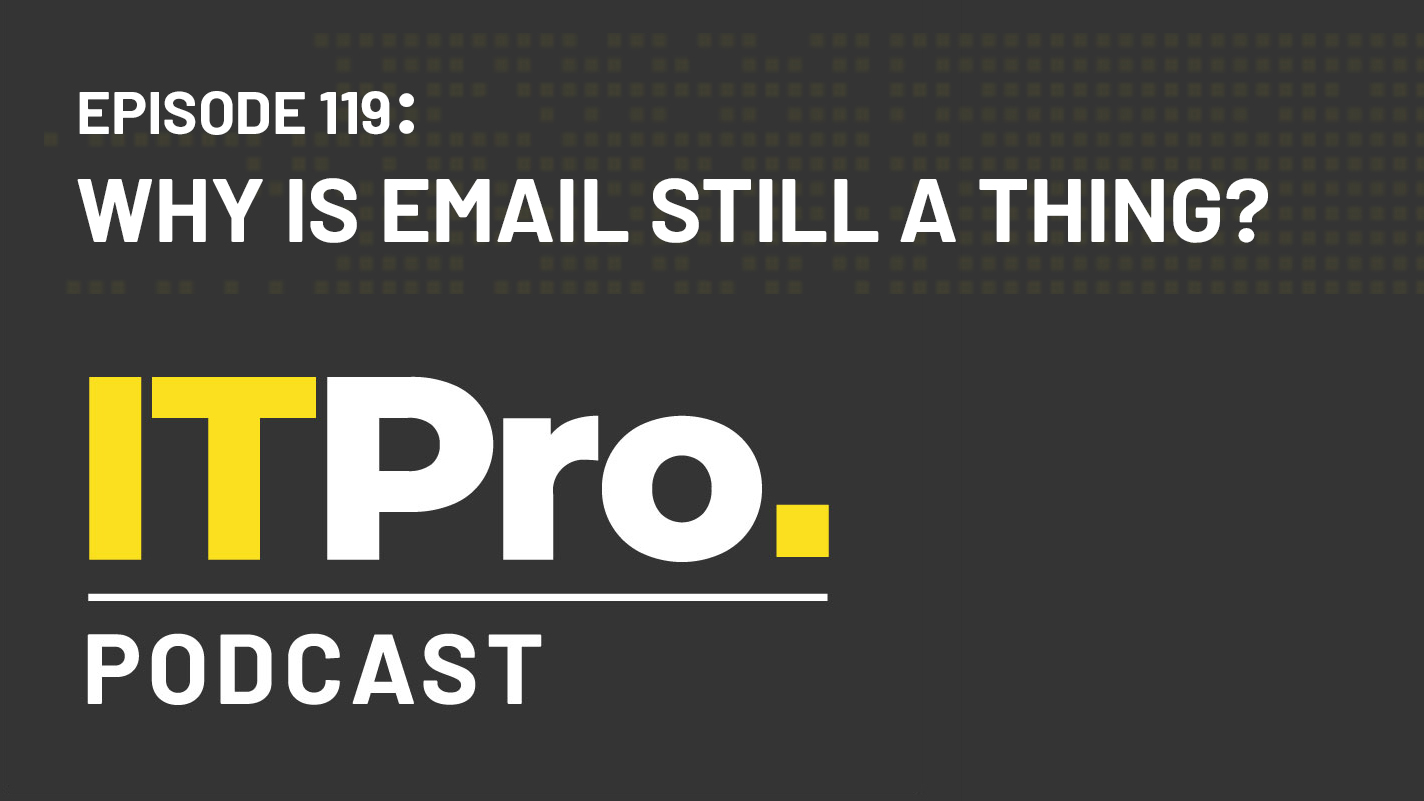The IT Pro Podcast: Why is email still a thing?
Despite a proliferation of newer collaboration platforms, email stubbornly refuses to go away

It seems that in the world of modern IT, you can’t swing a cat-6 cable without hitting four or five cloud-based platforms that are trying to revolutionise business communication. Despite the rise of platforms like Slack, Teams, Zoom and more, however, emails remain by far the most widely-used method of professional communication.
In this week’s episode, we take a look at why this comparatively ancient technology still persists so widely, as well as the advantages that it offers over newer platforms, and what inspiration they can take from it.
Highlights
“What it comes down to for me is - and I've been thinking about this, because I hate email, and I want it to die - but I think it serves a very important purpose in the sense that it's a medium where a lot of people who are going to try to communicate with me only live there; they're not bleeding into places like WhatsApp or whatever platform you might choose to speak to your contacts and so on. It's a very useful way of keeping people at arm's length, to some extent.”
“I think the key difference between email and these newer collaboration platforms for me, is that email was developed back in the 70s and 80s. And it was developed by researchers and academics as an open standard, that people then built proprietary clients on top of. It wasn't built as a walled garden enclosure where you had to be on one specific platform in order to use it. And I think that's why it's persisted so much; that openness means that it doesn't matter what email client you're using. If email was developed today, if I was on Gmail, I probably wouldn't be able to email someone that was using Outlook.”
“I would really like to receive any PR message or business offer by sitting on my front porch with some iced tea and someone rolling up on a horse and handing me a handwritten letter pitching whatever interview they want. This is how I imagine it would be in a perfect world.”
Read the full transcript here.
Footnotes
- In the end, email might actually kill off Slack
- Managing the oversaturation of workplace platforms
- Microsoft declares Slack isn't secure enough for its workers
- Slack plots 'enterprise-grade' security updates for Slack Connect
- Email is killing productivity, new research finds
- Zoom settles $85 million lawsuit over 'zoombombing', privacy policies
- The dangers of nighttime Slacking
- Working from home has created an "overtime epidemic"
- The IT Pro Podcast: Everyone needs Kubernetes certs
- The metaverse is a waste of time, effort and processing power
- How to give your business a voice
- Four ways the cloud facilitates workplace collaboration
- A new age of collaboration tools
- The social impact of remote collaboration
- Google and Microsoft's hybrid work battle shows the narrative is just as important as the technology
- IT Pro Panel: Why collaboration platforms are so hard to deploy
- How CIOs can build effective cross-business collaboration
Subscribe
- Subscribe to The IT Pro Podcast on Apple Podcasts
- Subscribe to The IT Pro Podcast on Google Podcasts
- Subscribe to The IT Pro Podcast on Spotify
- Subscribe to the IT Pro newsletter
- Subscribe to IT Pro 20/20
Get the ITPro daily newsletter
Sign up today and you will receive a free copy of our Future Focus 2025 report - the leading guidance on AI, cybersecurity and other IT challenges as per 700+ senior executives
ITPro is a global business technology website providing the latest news, analysis, and business insight for IT decision-makers. Whether it's cyber security, cloud computing, IT infrastructure, or business strategy, we aim to equip leaders with the data they need to make informed IT investments.
For regular updates delivered to your inbox and social feeds, be sure to sign up to our daily newsletter and follow on us LinkedIn and Twitter.
-
 CISA issues warning in wake of Oracle cloud credentials leak
CISA issues warning in wake of Oracle cloud credentials leakNews The security agency has published guidance for enterprises at risk
By Ross Kelly
-
 Reports: White House mulling DeepSeek ban amid investigation
Reports: White House mulling DeepSeek ban amid investigationNews Nvidia is caught up in US-China AI battle, but Huang still visits DeepSeek in Beijing
By Nicole Kobie
-
 Can better connectivity boost rural business?
Can better connectivity boost rural business?Podcast Rural businesses are still offered speeds far below the UK government’s gigabit target
By Rory Bathgate
-
 The dark side of Irish data centers
The dark side of Irish data centersITPro Podcast As Ireland grapples with data center energy demands, we ask if software developers can really benefit from virtual reality
By Rory Bathgate
-
 HPE Discover Barcelona: What’s the business benefit of supercomputers?
HPE Discover Barcelona: What’s the business benefit of supercomputers?ITPro Podcast With potential in fields such as AI to scientific modelling, global interest in supercomputers continues to rise
By Jane McCallion
-
 Hyperscalers go nuclear
Hyperscalers go nuclearITPro Podcast As energy costs for data centers become a challenge for cloud providers and AI developers alike, plentiful clean power is a key focus
By Rory Bathgate
-
 AI’s thirsty secret
AI’s thirsty secretITPro Podcast Data center expansion is putting freshwater sources under immense strain, with operators facing an environmental and PR reckoning
By Rory Bathgate
-
 The state of enterprise connectivity
The state of enterprise connectivityITPro Podcast Network technology is continuing to evolve as IT teams work to enable edge computing, expanding IoT, and AI needs
By Rory Bathgate
-
 What is HPC really for?
What is HPC really for?ITPro Podcast High-performance computing HPC is often touted as an area of major tech breakthroughs – but what are these and who is leading the charge?
By Rory Bathgate
-
 Can green tech meet surging energy demands?
Can green tech meet surging energy demands?ITPro Podcast Tech firms are pinning hopes on the rapid adoption of renewables and more efficient data centers to tackle energy-intensive AI workloads and ballooning data generation
By Rory Bathgate
